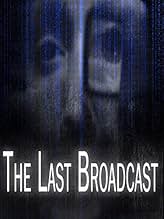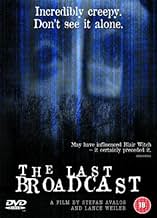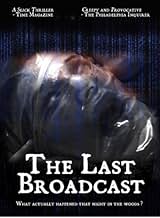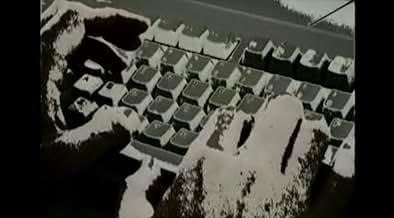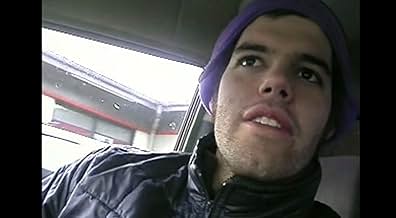VALUTAZIONE IMDb
5,2/10
6475
LA TUA VALUTAZIONE
Aggiungi una trama nella tua linguaA film crew ventures into the forest in search of the mythical 'Jersey Devil'.A film crew ventures into the forest in search of the mythical 'Jersey Devil'.A film crew ventures into the forest in search of the mythical 'Jersey Devil'.
Trama
Lo sapevi?
- QuizDubbed the first "desktop feature film", it was the first film to be filmed, edited, and screened entirely digitally. No film was involved.
- BlooperThe "Jersey Devil" investigation is started when someone comes on the internet to the TV show and says" Why don't you do a show on the "Jersey Devil"?. When this is referred to later, and shown on screen (twice), the caller says "Why don't you do a show on the pine barrens?".
- Citazioni
David Leigh, The Filmmaker: At 10 PM, in what will be the last broadcast, Fact or Fiction goes live.
- Curiosità sui creditiThe story and characters depicted in this movie are entirely fictitious. But please don't tell anyone.
- ConnessioniFeatured in Cinemassacre's Monster Madness: The Last Broadcast (1998) (2007)
Recensione in evidenza
The Last Broadcast is presented as if it's a "documentary" about the murder of two hosts and a hired hand for a cable access show named Fact or Fiction. In the scenario, Fact or Fiction was in New Jersey's Pine Barrens to present a live show on the Jersey Devil. A second hired hand is convicted of the murders (this isn't a spoiler because it's stated at the beginning of the film). The film also makes an attempt to become more philosophical towards the end, and there is an unexpected twist.
For me, this film failed on most levels, although there were a few small things that worked. The Last Broadcast is often compared to The Blair Witch Project, which arrived a year later. The comparison is appropriate, and it's difficult to imagine that The Blair Witch Project writer/directors didn't lift the basic idea from The Last Broadcast. The Blair Witch Project didn't work for me, either, although in my view, it works better than The Last Broadcast does. Both films rest on a similar gimmick of claiming to be partially a composed "documentary" and partially a collection of videotaped images by a group of young adults who are about to get killed in the woods, and we're watching them as "evidence" of what happened to them. Both have ambiguity whether something supernatural happened, as the characters were exploring a legend about a supernatural being, or whether more mundane homicides occurred. There are finer-grained similarities as well, but I mainly bring it up to give you an idea of what The Last Broadcast is like if you haven't seen it but you've seen The Blair Witch Project.
The first problem with The Last Broadcast is that it doesn't play like a documentary. I've seen many documentaries. I've never seen one that looked like The Last Broadcast. Rather, this film looks like how an amateur filmmaker who has never seen a documentary might imagine documentaries, armed only with a description of the genre. That's a big problem, because the film hinges on playing like a documentary. In a similar vein, there is a problem with the Fact or Fiction program, and the actors playing the hosts. Even though Fact or Fiction is supposed to only be a cable access show, the material is done poorly and the actors are unconvincing. Again, it looks more like an amateur filmmaker who has never seen cable access programming imagining what it would be like based on a description only.
Like The Blair Witch Project, another big problem with The Last Broadcast is that for some strange reason directors Stefan Avalos and Lance Weiler decided to use purposefully bad camera-work for much of the material, especially any footage shot by the Fact or Fiction guys, and footage by the documentary host, David Beard. While the idea to use purposefully bad camera-work isn't flawed, the execution is flawed, because the camera-work is so ridiculous that it again comes across like an amateur filmmaker imagining what bad camera-work might be like. Characters inexplicably will not keep the camera still (a really annoying scene showing this is when David Beard is filming himself in the woods towards the end and keeps revolving). They inexplicably have extreme close-ups of mouths, eyes, etc. If the idea is to make the documentary and the cable access show seem real, such exaggerated bad camera-work just does not work.
Another problem is that the documentary keeps repeating material. Most of the videotaped evidence is repeated many times. The 911 phone call is repeated. The narrator keeps repeating the same ideas over and over. It all plays like an attempt to pad out the film's running time. Also, the narrator has a very annoying monotone, which comprises the bulk of the dialogue throughout the film. It is another aspect that does not help sell the film as a documentary.
Finally, the attempt at becoming more philosophical about media's influence on reality perception is very sophomoric, and the big "twist" at the end was fairly inexplicable to me. There were a couple other small points throughout the film that were confusing to me, as well, such as why the soap opera director wasn't involved with the Pine Barrens shoot, but my attention might have drifted a couple times. I was also confused how Fact or Fiction, which was otherwise so technically bare bones and incompetent, was able to manage an audio/video as well as an Internet satellite feed miles into the woods in 1995.
On the plus side, the premise has promise--the story is interesting, and there are some nice shots of the woods accompanied by atmospheric music. Perhaps if the film were handled more conventionally, The Last Broadcast may have been moderately successful. Even though the twist made little sense to me, the style of the film at that point, which pulled further away from the feigned documentary, worked better for me.
For me, this film failed on most levels, although there were a few small things that worked. The Last Broadcast is often compared to The Blair Witch Project, which arrived a year later. The comparison is appropriate, and it's difficult to imagine that The Blair Witch Project writer/directors didn't lift the basic idea from The Last Broadcast. The Blair Witch Project didn't work for me, either, although in my view, it works better than The Last Broadcast does. Both films rest on a similar gimmick of claiming to be partially a composed "documentary" and partially a collection of videotaped images by a group of young adults who are about to get killed in the woods, and we're watching them as "evidence" of what happened to them. Both have ambiguity whether something supernatural happened, as the characters were exploring a legend about a supernatural being, or whether more mundane homicides occurred. There are finer-grained similarities as well, but I mainly bring it up to give you an idea of what The Last Broadcast is like if you haven't seen it but you've seen The Blair Witch Project.
The first problem with The Last Broadcast is that it doesn't play like a documentary. I've seen many documentaries. I've never seen one that looked like The Last Broadcast. Rather, this film looks like how an amateur filmmaker who has never seen a documentary might imagine documentaries, armed only with a description of the genre. That's a big problem, because the film hinges on playing like a documentary. In a similar vein, there is a problem with the Fact or Fiction program, and the actors playing the hosts. Even though Fact or Fiction is supposed to only be a cable access show, the material is done poorly and the actors are unconvincing. Again, it looks more like an amateur filmmaker who has never seen cable access programming imagining what it would be like based on a description only.
Like The Blair Witch Project, another big problem with The Last Broadcast is that for some strange reason directors Stefan Avalos and Lance Weiler decided to use purposefully bad camera-work for much of the material, especially any footage shot by the Fact or Fiction guys, and footage by the documentary host, David Beard. While the idea to use purposefully bad camera-work isn't flawed, the execution is flawed, because the camera-work is so ridiculous that it again comes across like an amateur filmmaker imagining what bad camera-work might be like. Characters inexplicably will not keep the camera still (a really annoying scene showing this is when David Beard is filming himself in the woods towards the end and keeps revolving). They inexplicably have extreme close-ups of mouths, eyes, etc. If the idea is to make the documentary and the cable access show seem real, such exaggerated bad camera-work just does not work.
Another problem is that the documentary keeps repeating material. Most of the videotaped evidence is repeated many times. The 911 phone call is repeated. The narrator keeps repeating the same ideas over and over. It all plays like an attempt to pad out the film's running time. Also, the narrator has a very annoying monotone, which comprises the bulk of the dialogue throughout the film. It is another aspect that does not help sell the film as a documentary.
Finally, the attempt at becoming more philosophical about media's influence on reality perception is very sophomoric, and the big "twist" at the end was fairly inexplicable to me. There were a couple other small points throughout the film that were confusing to me, as well, such as why the soap opera director wasn't involved with the Pine Barrens shoot, but my attention might have drifted a couple times. I was also confused how Fact or Fiction, which was otherwise so technically bare bones and incompetent, was able to manage an audio/video as well as an Internet satellite feed miles into the woods in 1995.
On the plus side, the premise has promise--the story is interesting, and there are some nice shots of the woods accompanied by atmospheric music. Perhaps if the film were handled more conventionally, The Last Broadcast may have been moderately successful. Even though the twist made little sense to me, the style of the film at that point, which pulled further away from the feigned documentary, worked better for me.
- BrandtSponseller
- 10 gen 2005
- Permalink
I più visti
Accedi per valutare e creare un elenco di titoli salvati per ottenere consigli personalizzati
- How long is The Last Broadcast?Powered by Alexa
Dettagli
- Data di uscita
- Paese di origine
- Sito ufficiale
- Lingua
- Celebre anche come
- Poslednji snimak
- Azienda produttrice
- Vedi altri crediti dell’azienda su IMDbPro
Botteghino
- Budget
- 900 USD (previsto)
- Lordo Stati Uniti e Canada
- 12.097 USD
- Lordo in tutto il mondo
- 12.097 USD
Contribuisci a questa pagina
Suggerisci una modifica o aggiungi i contenuti mancanti

Divario superiore
By what name was The Last Broadcast (1998) officially released in India in English?
Rispondi

